Shipped from abroad _ Delivery in 7 days
Intelligent Body Fat Scale Charging Electronic Weighing Scale Household Scale Bluetooth Adult Fat Scale Weigh
Intelligent Body Fat Scale Charging Electronic Weighing Scale Household Scale Bluetooth Adult Fat Scale Weigh
Couldn't load pickup availability
SPECIFICATIONS
Brand Name: other
Type: Household Scales
Origin: Mainland China
Certification: NONE
Choice: yes
• Intelligent Body Fat Scale :This scale goes beyond the traditional weighing device, offering an intelligent body fat scale that provides accurate and reliable results.
• Bluetooth Connectivity :Equipped with Bluetooth connectivity, this scale allows for wireless synchronization, making it convenient for users to track their weight progress remotely.
• Electronic Weighing Scale :The electronic weighing feature of this scale ensures precise weight measurements, eliminating any inaccuracies that may occur with manual scales.
• Household Use :Designed for household use, this scale is a perfect addition to any bathroom, providing a reliable and convenient way to monitor weight.
• Adult Fat Scale :Specifically designed for adults, this scale accurately measures body fat percentage, making it an ideal tool for those seeking to manage their weight and fitness.
• Charging Function :The charging function of this scale ensures long-lasting use, eliminating the need for constant battery replacements.
Parameter information:
Measuring range: usually from tens of grams to hundreds of kilograms, the specific range depends on different models.
Resolution: refers to the smallest resolvable unit of the measurement result. Common resolutions are 0.1 kg or 0.01 kg.
Accuracy: Indicates the deviation between the measured result and the true value, generally expressed as a percentage or a thousandth ratio.
Unit: You can choose different units of measurement, such as kilograms, pounds, etc.
Display screen: Usually a liquid crystal display screen displays measurement results and other relevant information.
Material: The shell is usually made of durable plastic or metal, and the weighing platform may use steel plate, glass and other materials.
Power: Electronic scales usually use battery power, but some models support plug-in power.
Functions: Some advanced electronic scales may have a variety of functions, such as automatic shutdown, storage of measurement data, BMI calculation, etc.
Dimensions: Includes the dimensions of the entire scale as well as the dimensions of the weighing platform, taking into account the space suitable for placement and use.
Other features: such as anti-slip design, automatic zero calibration, backlight display, etc.

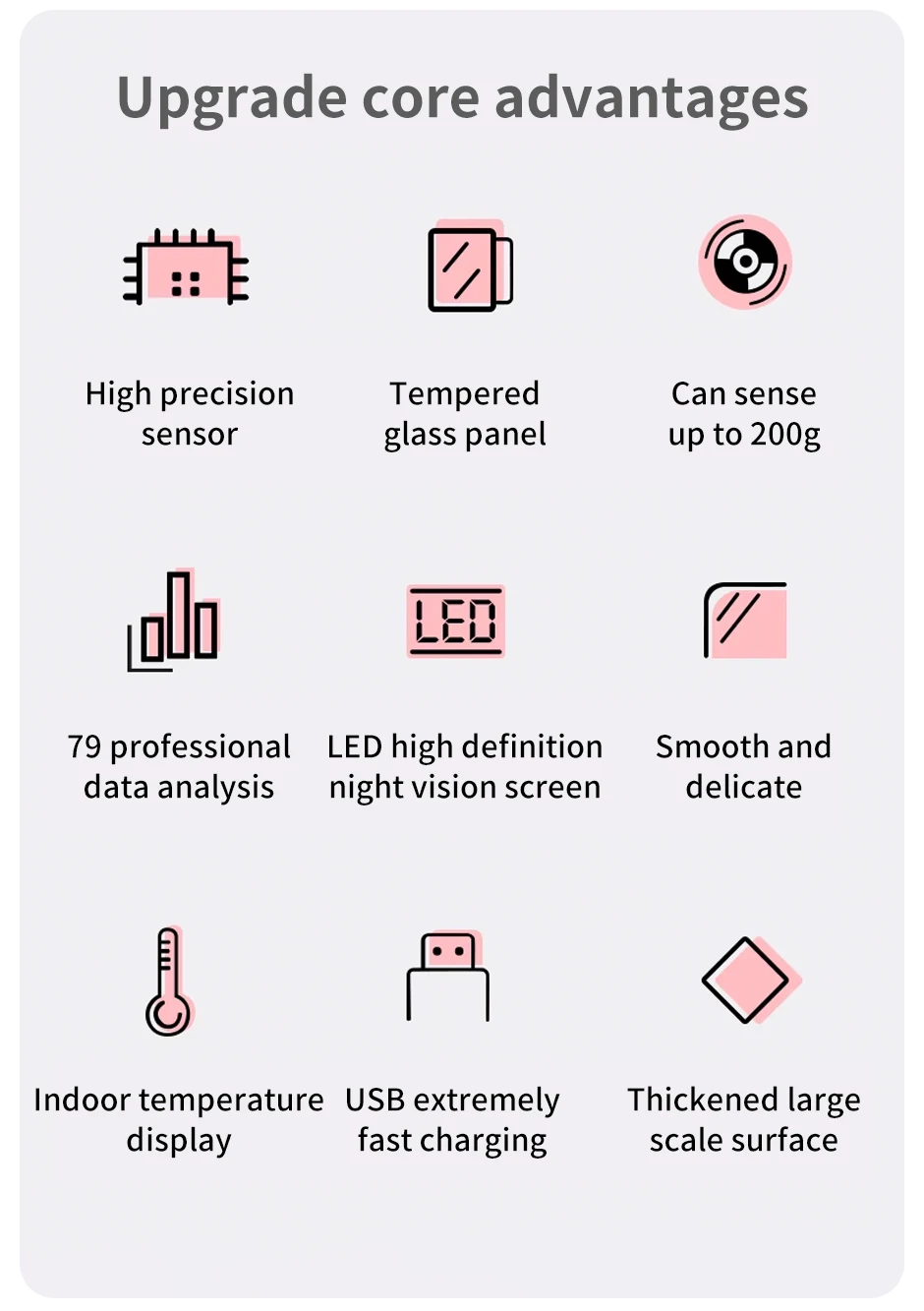
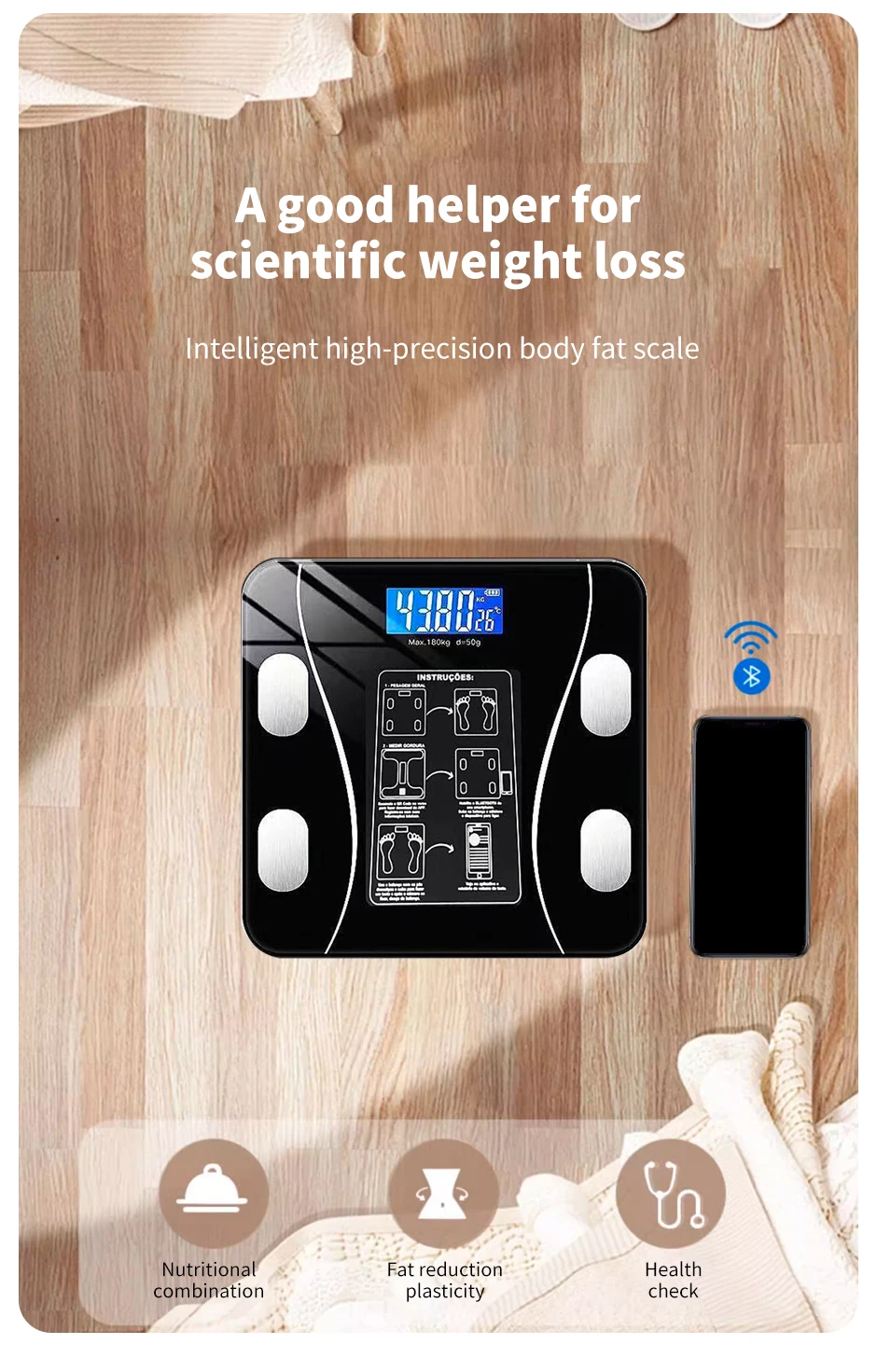

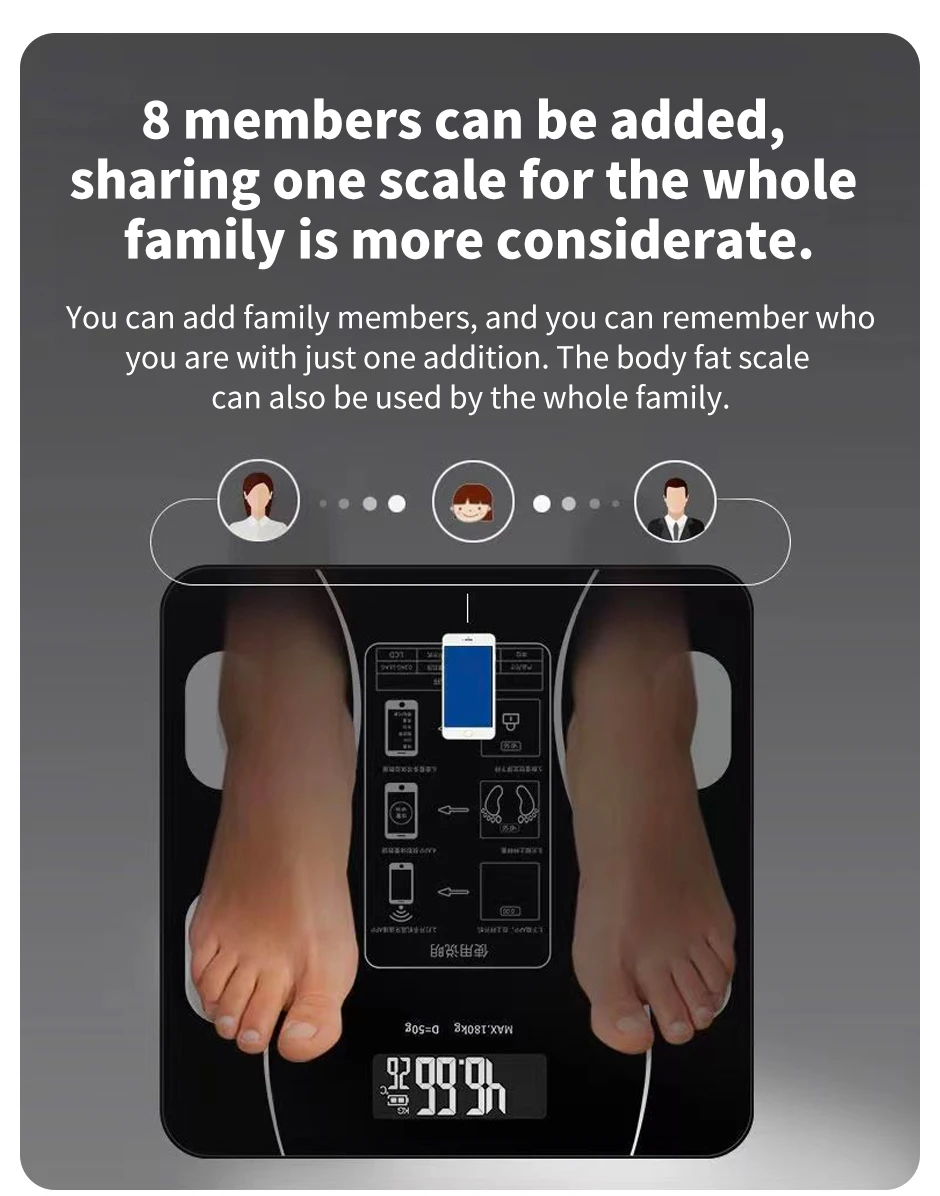
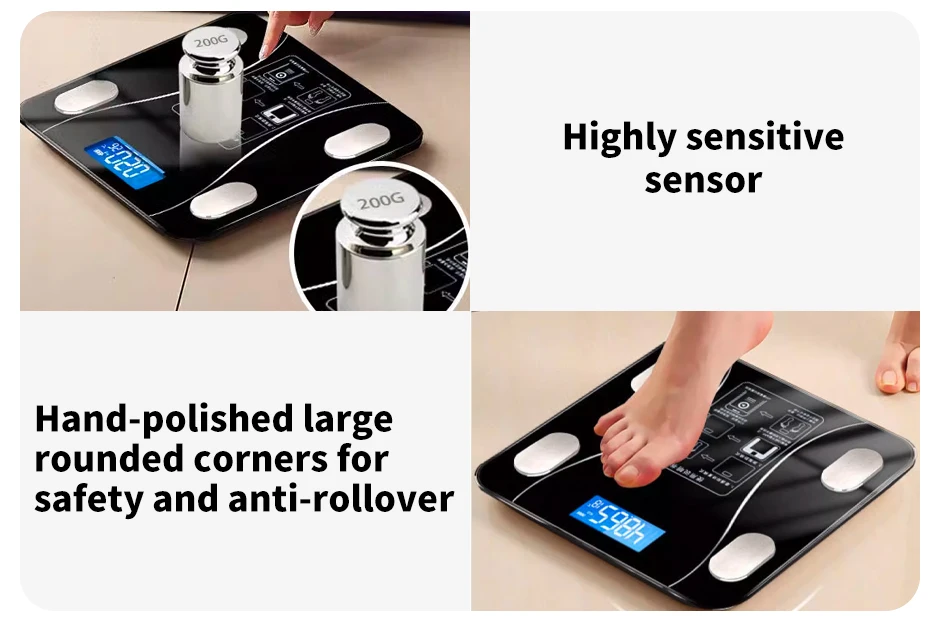

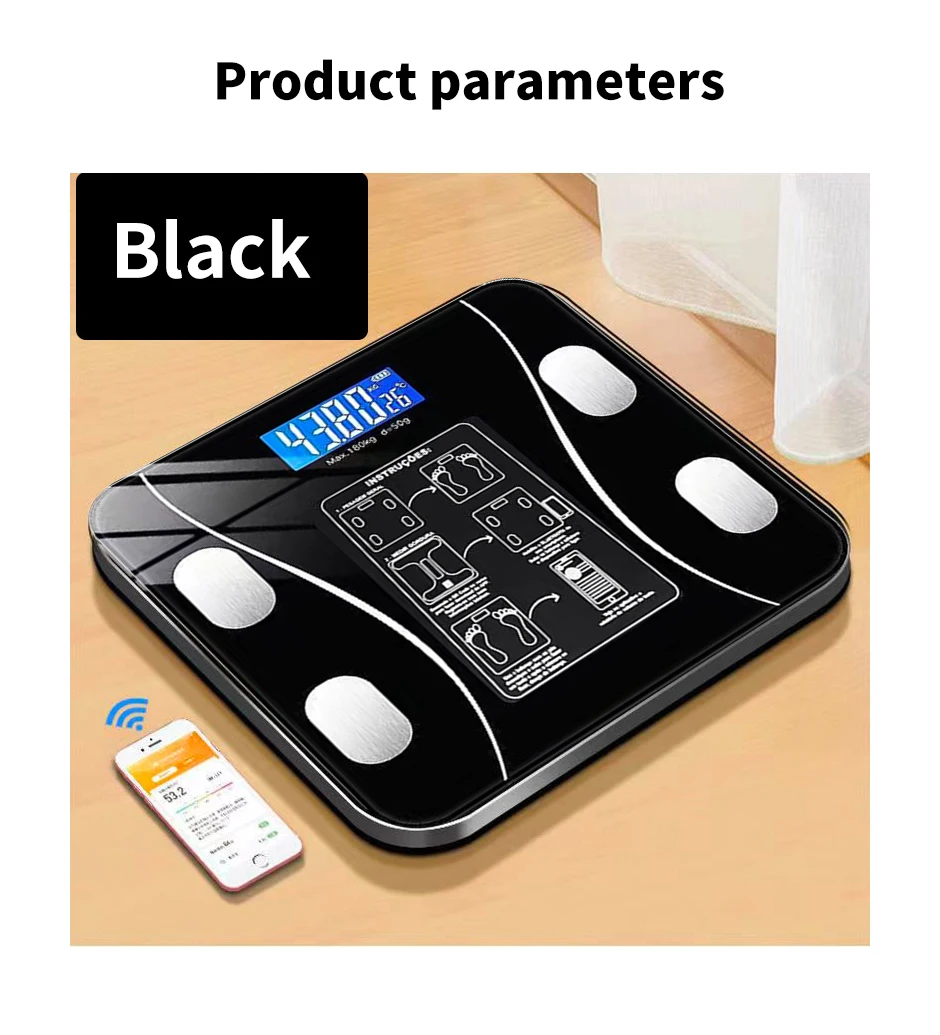
Note:
Smooth placement: Place the scale on a firm, flat surface to ensure stability and accuracy.
Naked measurement: In order to obtain accurate weight data, it is best to stand naked on the scale and avoid wearing shoes, socks or heavy clothing.
Steady standing: When standing on the scale, try to keep your body balanced and steady without rocking or moving.
Same time period: For more accurate weight changes, it is recommended to take measurements at the same time period (such as after waking up in the morning).
Multiple measurements Averaging: Since there will be small fluctuations in weight, it is recommended to take multiple measurements and average them for more accurate results.
Follow the product instructions: Carefully read and follow the operating instructions and precautions in the product instructions, depending on the brand and model of scale used.
Regular calibration: The scale is calibrated regularly as needed to ensure its accuracy. You can refer to the product manual or contact the manufacturer for the appropriate calibration method.
Cleaning and maintenance: Clean the scale regularly to avoid dust and dirt affecting the measurement results. Wipe with a soft cloth and avoid chemical cleaners.
Not suitable for certain groups: Scales are not suitable for certain groups such as infants, pregnant women, pacemaker patients, etc. Please consult a doctor or professional according to your personal situation.
Repair and maintenance: If necessary, repair or replacement of parts of the scale should be carried out by professionals, avoid disassembling or repairing yourself.
FQA
Q: What should I pay attention to when using an electronic scale?
A: The following points need to be noted when using an electronic weight scale:
Place the scale on a flat, firm surface to ensure accurate measurements.
Make sure your feet are dry and clean, and avoid taking measurements in shoes or socks.
Stand steadily on the scale and try to keep your balance.
In the same time period, it is best to take measurements under the same conditions each time (such as after getting up in the morning).
Q: How to solve the problem of electronic weight scale error?
A: If you find that there is an error in the electronic weight scale, you can try the following methods to eliminate it:
Check that the battery has enough charge, low charge may lead to inaccurate measurement results.
Check that the scale is placed on a flat, firm surface; unstable support can affect accuracy.
If it is an adjustable scale, check that the zero point is set correctly.
Clean the weighing platform of the scale to prevent dust or dirt from affecting the measurement results.
Q: What does the resolution of an electronic scale mean?
A: The resolution of an electronic scale refers to the smallest unit of weight it can display. For example, if the scale has a resolution of 0.1 kg, it can display values that start at 0.1 kg in increments of 0.1 kg.
Q: How to choose the right electronic scale for you?
A: When choosing the right electronic scale for you, you can consider the following factors:
Measurement range and resolution: Determine if you need to measure a wider range or more accurately based on your needs.
Accuracy: Check the accuracy information in the product specification sheet and try to choose a scale with higher accuracy.
Functions and features: Based on personal preferences and needs, choose a scale with the required functions (such as automatic shutdown, storage, etc.).
Material and design: Consider the durability of the material and the aesthetics of the design, and choose a scale that meets your preferences.
Q: Can an electronic scale measure anything other than body weight?
A: Some advanced electronic scales may have additional functions, such as measuring body fat content, water content, muscle mass, etc. These scales are usually implemented using techniques such as resistive or bioimpedance analysis. If you need these functions, you can choose an electronic weight scale with corresponding functions.
Share












